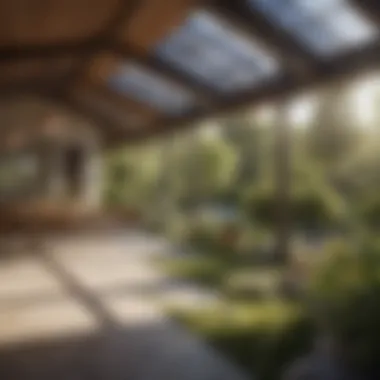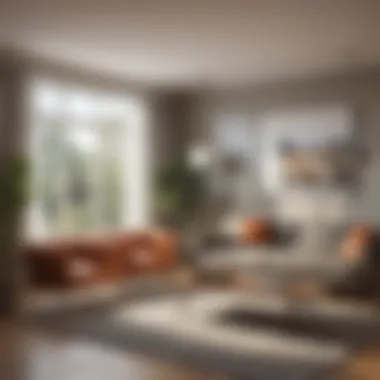Factors That Increase Home Value Effectively


Intro
The value of a home extends beyond mere square footage and location. It encompasses various factors that equally contribute in elevating its worth. For homeowners and property enthusiasts, understanding these elements is crucial. Knowledge of how design, landscaping, and energy efficiency work together can yield substantial benefits. This article will explore these components, revealing ways to enhance property value through thoughtful improvements.
Design Trends
As trends in design evolve, they play an essential role in home valuation. Homeowners should stay informed about current popular styles and color palettes that resonate with buyers.
Current Popular Styles
Modern minimalism has surged in popularity. Its clean lines and functional spaces appeal to many, making it a timeless choice. Additionally, elements of industrial design, incorporating raw materials like metal and wood, add a degree of sophistication. Here are a few styles worth considering:
- Mid-Century Modern: This style reflects the beauty of simplicity and functionality.
- Scandinavian Design: Characterized by its use of light and airy spaces with natural textures.
- Farmhouse Aesthetic: Blending contemporary with rustic, this style has thrived in recent years.
Color Palettes for Modern Spaces
Selecting the right color palette is fundamental to creating an inviting environment. Soft neutrals, like whites and beiges, create a serene backdrop for any space. Adding pops of color through furniture or decor can instill character. When updating spaces, consider:
- Earthy Tones: Browns and greens reflect a connection with nature.
- Bold Accents: Deep blues or rich reds can energize a room.
- Monochromatic Schemes: Using various shades of the same color can create an elegant feel.
Landscaping Enhancements
An attractive landscape not only improves curb appeal but can significantly boost a property’s value. Potential buyers often see well-maintained lawns and gardens as indicators of overall home care. Investing in landscaping entails:
- Native Plants: Choosing species that thrive in your local area reduces maintenance efforts and costs.
- Outdoor Living Spaces: Patios, decks, and outdoor kitchens enhance functional living areas.
- Lighting: Strategically placed outdoor lights can create a welcoming evening ambience.
Energy Efficiency
Energy-efficient homes are increasingly in demand. Improvements in this area can lead to cost savings and a smaller environmental impact. Here are some initiatives to consider:
- Insulation Upgrades: Proper insulation can reduce heating and cooling costs.
- Energy Star Appliances: Replacing old appliances with Energy Star certified ones is beneficial for both utility bills and home value.
- Solar Panels: Though a larger upfront investment, solar energy can greatly increase a home’s long-term value.
Finale
Understanding Home Value
Home value is a central element in real estate. Understanding home value is crucial for homeowners, buyers, and investors alike. It carries significant implications on finances and investment decisions. Knowing how value is determined helps in making informed choices about renovations, purchasing, or selling a home.
Key factors affecting home value include the local market, the condition of the property, and overall economic conditions. Understanding these aspects allows individuals to approach real estate with more knowledge.
In this article, we will explore various elements that directly impact home value. Through this knowledge, homeowners can take actionable steps towards increasing their property’s worth.
Defining Home Value
Home value refers to the monetary worth of a property. It is influenced by numerous attributes including location, size, condition, and features of the home. Therefore, home value is not static; it fluctuates based on changes in the market and property condition. Essentially, home value is what a buyer is willing to pay for a property. Real estate appraisers utilize various methods to determine this value.
Market Influencers
Market influencers play an important role in shaping home value. They give insights into how and why certain properties may increase or decrease in worth over time. Key influencers include economic factors, local market trends, and community development.
Economic Factors
Economic factors refer to elements that influence the overall economy and can affect home values. These include interest rates, employment levels, and economic growth. For example, low-interest rates often make borrowing cheaper. This can lead to more buyers in the market and may drive up home prices.
Furthermore, a growing economy typically leads to job creation. More jobs mean more people looking for homes. Thus, understanding economic factors can benefit home sellers and buyers alike. It is critical to keep an eye on these elements when considering home investments.
Local Market Trends
Local market trends focus on the specific real estate conditions in a geographic area. This includes supply and demand dynamics, property prices, and neighborhood desirability. For instance, if a neighborhood sees an influx of young professionals, home values may rise due to increased demand.
Monitoring these trends gives homeowners insight into the timing of potential sales or purchases. Being aware of local market trends can greatly aid in making strategic decisions. Sellers can adjust their pricing strategies based on prevailing trends.
Community Development
Community development encompasses various enhancements to neighborhoods, which can greatly affect home value. Infrastructure improvements, new schools, and parks contribute positively. These changes make the area more attractive to potential buyers, inflating home values.
An area with a strong sense of community, active neighborhood associations, and good safety ratings tends also to draw more interest from buyers. Therefore, attention to community development initiatives can directly impact property value.
Understanding these market influencers is essential. They can help homeowners navigate the complexities of real estate and make informed decisions.


The Role of Curb Appeal
Curb appeal matters. This is the first impression a visitor or potential buyer has of your home. It can either captivate the viewer or leave them unimpressed. A well-maintained exterior enhances the overall attractiveness of the property. Elements like landscaping and exterior features contribute significantly to increasing home value. The benefits include better marketability and potentially higher selling prices. It is essential to consider both aesthetics and functionality in achieving optimal curb appeal.
Landscaping Improvements
Plant Selection
Choosing the right plants is crucial. Selecting appropriate species enhances the visual charm of the yard. You may prefer native plants. Their low maintenance needs and environmental benefits make them an attractive option. These plants are adapted to the local climate and soil conditions. Consideration must also be given to seasonal changes and blooming cycles. This ensures that your garden remains visually appealing throughout the year. However, you must be cautious of invasive species, as they can harm local ecosystems.
Lawn Maintenance
Maintaining a healthy lawn is another vital factor. A lush, green lawn can elevate your home’s appeal. Regular mowing, watering, and fertilization are key tasks. Additionally, it is important to manage weeds and pests effectively. A neat lawn not only looks appealing but also creates a welcoming ambiance. However, excessive watering can lead to higher utility costs. Balancing care and conservation remains essential to achieve a desirable lawn.
Garden Design
Thoughtful garden design enhances visual complexity. This aspect combines elements of planting, pathways, and structures. A well-designed garden can create a focal point and guide visitors through the space. Consider including features like raised beds or decorative stones. These elements can create interest and contrast. However, careful planning is necessary to avoid clutter. Overly complex designs can detract from the overall appeal and may require significant maintenance.
Exterior Upgrades
Painting and Siding
Exterior paint and siding significantly impact aesthetics. A fresh coat of paint can change the entire look of a house. Neutral colors are popular and can attract a wider audience. Additionally, durable siding materials like vinyl or fiber cement can provide longevity. This investment often pays off when you list your home. However, painting requires regular upkeep. Neglecting these tasks can lessen the appeal of your property over time.
Roof Replacement
A new roof serves multiple purposes. It improves the home’s look and provides vital protection against the elements. When evaluating roof replacement options, consider materials such as asphalt shingles or metal roofing. Both come with their advantages. For example, metal roofing boasts longevity and energy efficiency. However, the upfront investment may be higher compared to asphalt. Balancing long-term value with initial costs is crucial for homeowners.
Entryway Enhancements
The entryway sets the tone for the entire home experience. Simple enhancements such as new doors, lighting, or decorative planters can transform this space. Choosing a stylish front door can create an inviting entry. Optimizing the pathway leading to the door is equally important. Interesting landscaping or decorative elements can guide the visitor's attention. Neglecting the entryway can leave an unwelcoming first impression. Thus, significant emphasis should be placed on enhancing this space.
Interior Design Considerations
Interior design plays a crucial role in enhancing a home's value. Thoughtful design choices can significantly impact a property’s appeal, making it more attractive to potential buyers. When homeowners invest in their interior spaces, they often create environments that are not only aesthetically pleasing but also functional. This encourages a harmonious living experience and leads to better overall satisfaction with the home.
Space Optimization
Open Floor Plans
Open floor plans have become an attractive option for many homeowners. The primary characteristic of this layout is the elimination of walls between living and dining areas, creating a seamless flow in space. This is appealing as it gives an impression of spaciousness, making smaller homes feel larger.
The benefit of choosing an open layout is the versatility it offers. It allows better interaction among family members as spaces become more communal. However, one must consider that such plans can sometimes disturb privacy since there are fewer dedicated rooms. Nonetheless, this design choice aligns well with current design trends, often leading to improved property values.
Decluttering Strategies
Decluttering is another essential aspect of interior design. Its main focus is on reducing excess items in a space, which helps to improve organization and visual appeal. This strategy is often seen as beneficial for increasing a home's marketability. By maintaining an uncluttered space, you allow potential buyers to visualize their own belongings in the home.
Moreover, decluttering can enhance the perception of space. A clean area can convey better light and make rooms appear larger. However, it's crucial to strike a balance between minimalism and livability, ensuring that homes feel welcoming rather than barren.
Modernization Techniques
Kitchen Renovations
The kitchen often serves as the heart of the home. Renovations in this area are particularly impactful because they can vastly improve functionality and aesthetics. Modern kitchens often feature upgraded appliances, new cabinetry, and stylish countertops. Investing in kitchen renovations can lead to a significant increase in home value.
Consideration of layout and flow is vital here. An efficient kitchen can make cooking and gathering enjoyable. However, renovation costs can be high, and homeowners must meticulously plan to ensure a return on their investment.
Bathroom Updates
Similar to kitchen renovations, updating bathrooms can greatly contribute to a home's overall value. Key features often include modern fixtures, updated tiles, and improved lighting. A well-designed bathroom can evoke a sense of luxury, significantly enhancing the appeal to buyers.
Investing in high-quality materials can also provide long-term benefits. Nevertheless, like kitchen renovations, bathroom updates can become costly, so careful budgeting and planning are essential.
Smart Home Integration
Integration of smart home technology is increasingly in demand. This includes features such as smart lighting, security systems, and temperature controls. Homebuyers value these modern conveniences, and they can lead to a faster sale and potentially a higher selling price.
Incorporating technology is seen as a forward-thinking approach. However, homeowners should recognize that while it can enhance value, not all tech upgrades will have an equal return. Prioritizing popular and reliable products is key in this area.


Energy Efficiency Enhancements
Energy efficiency is critical for increasing home value and reducing long-term costs for homeowners. Improvements in this area not only help to lower utility bills but also attract buyers who prioritize sustainability. As energy prices rise, homes with energy-efficient features are increasingly desirable in the market.
Energy-Efficient Windows
Installing energy-efficient windows is a significant step toward improving a home's energy performance. These windows are designed to minimize heat transfer, ensuring that homes stay warmer in winter and cooler in summer. The use of double or triple glazing, which involves multiple panes of glass, enhances insulation. This results in reduced energy costs and less reliance on heating and cooling systems.
Homeowners should consider additional features such as low-emissivity (Low-E) coatings, which reflect heat back inside during winter months and block excess heat during summer. Not only do these windows improve comfort, they also enhance curb appeal, a crucial factor for potential buyers. Investing in energy-efficient windows can yield a good return on investment, as the appeal to eco-conscious buyers continues to grow.
Insulation Improvement
Improving insulation is another core aspect of enhancing energy efficiency. Insulation prevents unwanted heat transfer, which is crucial for maintaining a consistent indoor temperature. By enhancing insulation in areas such as attics, walls, and basements, homeowners can significantly decrease energy consumption.
Effective insulation materials, such as fiberglass batts or spray foam, provide excellent thermal resistance. Additionally, sealing gaps and cracks around windows and doors can stop air leaks. This not only contributes to lower energy bills but also increases comfort. For buyers, a well-insulated home signals less maintenance and lower costs in the future, making it a smart investment.
Renewable Energy Options
Investing in renewable energy options signifies a commitment to sustainability and can dramatically elevate a home’s value.
Solar Panel Installation
Solar panel installation is one of the most impactful renewable energy solutions. These systems harness sunlight to generate electricity, which can directly power the home, reducing dependence on utility companies. A primary characteristic of solar panels is their ability to produce clean energy, resulting in lower carbon footprints.
An attractive feature of solar panels is their long-term financial benefits. Although the initial investment can be high, homeowners often see significant savings on their energy bills. Additionally, many places offer tax incentives or rebates for these installations, further offsetting costs. On the downside, the installation requires adequate roof space and specific orientations to maximize efficiency, which may not be available for all homes.
Energy Star Appliances
Energy Star appliances are designed to use less energy than standard models, providing cost savings and reducing environmental impact. These appliances meet strict efficiency guidelines set by the U.S. Environmental Protection Agency. Investing in Energy Star-rated products, like refrigerators, washing machines, and dishwashers, can improve a home's appeal to buyers through clear operational cost savings.
A unique aspect of Energy Star appliances is their transformative potential in modern homes. Not only do they promote a sustainable lifestyle, but they can also be seamlessly integrated into existing kitchen and laundry designs. However, some may argue that the upfront costs are typically higher compared to traditional appliances, yet the efficiency and potential savings usually justify the expense over time.
Additional Spaces and Amenities
Additional spaces and amenities play a significant role in increasing home value. They provide flexibility in how a space can be utilized, allowing homeowners to meet diverse needs and preferences. From finished basements to outdoor living areas, these enhancements can transform a property and offer substantial appeal to potential buyers. It is important to consider not only the initial investment involved but also how these improvements can enhance daily living and create lasting value over time.
Finished Basements
A finished basement can significantly increase usable square footage in a home. It provides additional space that can serve various purposes, such as a recreation room, extra bedroom, or even a rental suite. Having a finished basement can appeal to families looking for extra room or individuals seeking flexible space.
Key Benefits:
- Versatility: The basement can be customized to fit the homeowner's lifestyle. This means it can change over time with family needs.
- Increased Comfort: Designed correctly, a finished basement can contribute to the overall comfort of the home with proper lighting and ventilation.
However, it is vital to ensure proper waterproofing and insulation. Without these considerations, a basement may face issues like dampness or mold, which can be detrimental to both health and home value.
Outdoor Living Areas
Outdoor living areas are increasingly popular among homeowners. These spaces effectively extend the home's living space and are ideal for entertainment and leisure. They not only enhance the aesthetic appeal but also improve the overall value of the property.
Decks and Patios
Decks and patios provide the perfect spots for outdoor relaxation and gatherings. They are often valued for their potential to facilitate social interactions and barbecues during pleasant weather. The primary characteristic of a deck or patio is their ability to offer a seamless transition between indoor and outdoor spaces.
Advantages of Decks and Patios:
- Increased Living Space: They create an extension of the home, making outdoor events easily accessible.
- Aesthetic Appeal: A well-designed deck can enhance the overall look of the home and yard.
Disadvantages:
- Seasonal Use: These spaces may not be useful year-round, depending on the climate. Additionally, maintenance can become a factor for homeowners.
Fire Pits and Outdoor Kitchens
Fire pits and outdoor kitchens are modern luxuries that can dramatically increase a property's value. They are appealing features that turn a yard into an inviting gathering spot.
The appeal of fire pits lies in their ability to create an ambiance for evening gatherings. They provide warmth and a focal point for social interactions, making outdoor spaces more enjoyable during cooler months. Outdoor kitchens add another layer of functionality, facilitating cooking and dining outside.
Key Characteristics:


- Enhanced Entertainment: Both features encourage outdoor gatherings, which is particularly attractive to families and social butterflies.
Advantages:
- Lifestyle Upgrade: They elevate the outdoor experience, which many buyers find desirable.
- Investment Potential: The addition often results in a strong return on investment in home sales.
However, these amenities require careful planning and investment. They need quality materials and proper construction to maximize value and durability.
Home Office Spaces
The demand for home office spaces has surged, particularly in the wake of recent global events. Having a designated area for work can improve productivity and separate work life from personal life.
Key Benefits of Home Office Spaces:
- Increased Resale Value: Homes with a dedicated office can attract buyers seeking remote work solutions.
- Functional Design: A well-planned office can enhance the overall functionality of the home.
Investing in additional spaces and amenities can significantly boost a home's value and increase its attractiveness in the real estate market. By providing versatile uses and appealing features, these enhancements contribute to both personal satisfaction and financial returns on investment.
Neighborhood Considerations
Neighborhood considerations play a significant role in evaluating a home's value. They encompass various elements that can impact not just the market price but also the desirability of living in a particular area. Understanding these factors helps homeowners and potential buyers make informed decisions regarding property investments.
School District Quality
The quality of local school districts is a major factor in determining home values. Families often prioritize education when selecting a neighborhood. Homes located in districts with high ratings typically command higher prices. Potential buyers may research schools based on performance metrics, such as test scores and graduation rates, which contributes to an area's attractiveness.
Safety Ratings
Safety is another critical consideration that influences home values. Areas with low crime rates are more desirable to families, thus elevating property values. Homeowners should be aware of local safety ratings accessible through community resources or online platforms. Understanding the safety of a neighborhood can help gauge its long-term viability as an investment.
Local Amenities
Proximity to Parks
Parks serve as essential community hubs, promoting outdoor activities and social interactions. The presence of parks near a property enhances its value. Buyers often seek neighborhoods with easy access to green spaces, as they contribute to a healthier lifestyle. Furthermore, parks provide unique features, such as walking trails and sports areas, which can significantly enhance community living.
Access to Retail
Access to retail outlets is a defining characteristic of a neighborhood's charm. Homes located near shops, supermarkets, and restaurants generally see higher demand. This aspect offers convenience to residents, allowing for easier daily errands. However, it is crucial to also consider the potential disadvantages, such as increased traffic or noise levels, from nearby commercial areas. Understanding the balance between convenience and livability is key.
"A strategic location within a vibrant neighborhood can elevate a property’s desirability beyond its physical features."
Long-Term Maintenance and Upkeep
Homeownership extends beyond the joys of decorating and remodeling. What often captures less attention is the critical role of long-term maintenance and upkeep. This aspect can significantly influence a home's value over time. Owners who prioritize these duties not only preserve but also enhance their property value. This section explores key elements of maintenance that should be on every homeowner's radar.
Routine Inspections
Regular inspections serve as the foundation for effective maintenance. By following a scheduled routine, homeowners can identify potential issues before they escalate into costly repairs. Assessing various areas is essential.
- Roof: Look for signs of wear or damage, such as missing shingles or leaks.
- Plumbing: Check for leaks or corrosion around fixtures.
- Electrical Systems: Ensure there are no frayed cords or malfunctioning outlets.
It is also beneficial to document these inspections. Keeping a log helps track the condition of the home over time. This method not only aids planning future updates, but it also provides valuable information when selling the property.
Preventative Maintenance
Preventative maintenance goes hand-in-hand with routine inspections. This approach involves proactive measures to avert problems rather than reacting to them. Basic tasks can drastically reduce the risk of damage and have a positive impact on home value.
Common preventative measures include:
- Gutter Cleaning: Ensures that water drains properly, protecting the foundation.
- Seasonal HVAC Maintenance: Regular servicing helps maintain efficiency and extend lifespan.
- Pest Control: Minimizing pest populations prevents structural damage.
Incorporating these practices into your routine keeps maintenance burdens manageable. Moreover, addressing these concerns early can also play a significant role during home appraisal or sale, ultimately better reflecting the cared-for status of the property.
"A well-maintained home reflects an investment in your future. Regular attention not only keeps issues at bay but actively enhances property worth."
Overall, diligence in long-term maintenance and upkeep is essential. It preserves aesthetic appeal and functional integrity, reinforcing the investment homeowners make in their properties.
Ending
The conclusion of this article underscores the multi-faceted approach homeowners must take to enhance property values. Understanding what increases home value is crucial for anyone looking to sell or simply improve their living environment. The interactions between various elements—such as curb appeal, interior design, energy efficiency, and neighborhood features—create a harmonious impact on market worth. A strategic focus on these factors can yield significant financial benefits and an improved quality of life.
By synthesizing the discussed factors, homeowners can make informed decisions that align with their goals. Investing time and resources into these enhancements not only maximizes home equity but also fosters a more appealing atmosphere for residents and guests alike. As the housing market continues to evolve, staying updated on these influences is vital for maintaining and increasing property value.
Summary of Key Points
- Curb Appeal: Enhancements such as landscaping and exterior upgrades draw attention and create a positive first impression.
- Interior Design Optimizations: Effective use of space and modernization efforts greatly impact a home’s allure and functionality.
- Energy Efficiency: Investments in efficient appliances and energy-saving features reduce costs and appeal to environmentally-conscious buyers.
- Amenities and Additional Spaces: Constructing additional rooms, like home offices or outdoor living areas, increases versatility and desirability of the property.
- Neighborhood Factors: Local real estate market conditions, safety, and school district ratings significantly influence buyer decisions.















